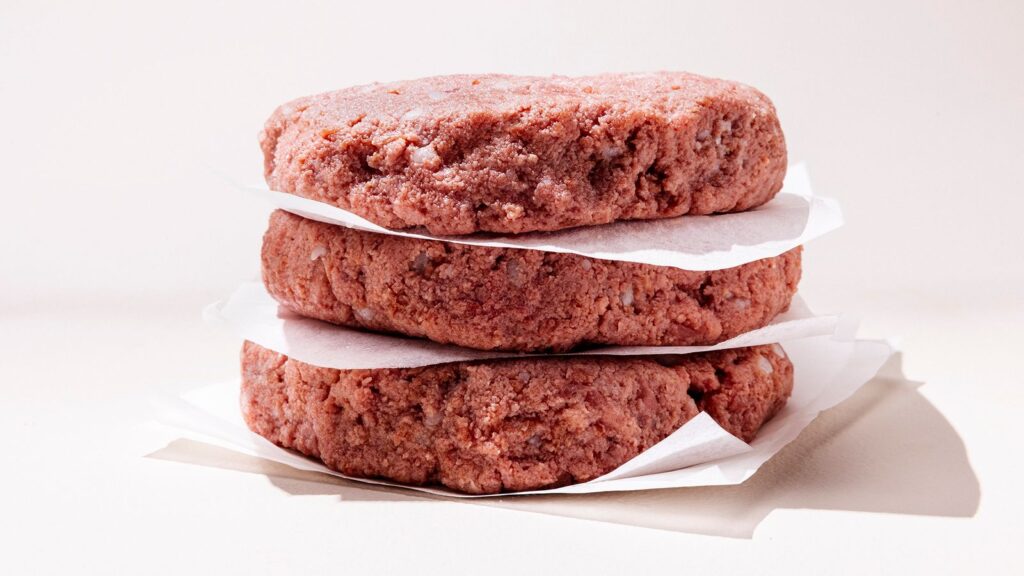
5 Mins Read
Los Angeles startup Omeat, which launched in June after four years in stealth mode, has launched and already completed the first commercial sales of Plenty, its ethical and affordable alternative to fetal bovine serum (FBS). The product is available to buy for cultivated meat companies, presenting a slaughter-free substitute for the controversial growth medium and signals the launch of Omeat’s B2B arm.
Omeat claims it’s among the first revenue-generating cultivated meat companies, having created a cell culture supplement that can dramatically cut costs and be scaled up to meet the global demand for cultivated protein – a market that could reach $25B by 2030 if consumer acceptance grows. A 2021 poll conducted by Israeli cultured meat producer Aleph Farms showed that 87-89% of Gen Zers, 84-85% of millennials, 76-77% of Gen Xers, and 70-74% of boomers were at least somewhat open to trying cultivated meat.
The problem with FBS

FBS originally paved the way for cultivated meat production, but it’s a problematic substance. Harvesting it entails taking cells from the fetuses of pregnant cows during their mutual slaughter. The resulting meat is thus not animal-free, and this has raised a lot of ethical concerns, particularly amongst animal activists.
Moreover, it’s an exorbitantly expensive process. When Dutch cultivated meat pioneer Mosa Meat introduced the first cell-based burger 10 years ago, it cost $300,000 for two beef patties. While tech advancements have naturally helped such processes scale up and cut costs, removing FBS played a major role in that.
Now, industry think tank the Good Food Institute predicts that cultivated meat could reach price parity with its traditional counterparts by as early as 2030, with further analysis by industry supplier Ark Biotech highlighting how cost-competitive cultivated meat could become a reality.
In 2019, Mosa Meat itself became the first company to ditch the serum, and in a remarkable move, published the formulation for developing serum-free growth media for cultivated meat last year. Now, more and more companies are looking to move away from FBS, and Omeat says Plenty is a humane, affordable, scalable, and highly effective option for cell culture growth.
Japanese startup IntegriCulture also developed cultivated chicken and duck liver cells using a serum-free medium, and South Korea’s CellMEAT created a serum-free cell culture medium to drive down production costs and provide an ethical cell-cultured meat option. But Omeat claims other FBS alternatives on the market fall short of efficacy and consistency when compared to Plenty.
The Plenty difference
Plenty is created using regenerative plasma drawn humanely from cows that graze freely on Omeat’s carbon-negative farm. Collected weekly, the process to extract the plasma is similar to human plasma donation. Unlike blood, plasma regenerates quickly, so the cows do not feel depleted.
“With one cow providing plasma weekly, we can create many cows’ worth of meat annually,” explained Omeat founder and CEO Ali Khademhosseini during its June debut. The company can produce 20 times more meat per cow than if it was slaughtered. “This means we can feed the planet with only a fraction of the current number of animals used in beef production.”
“We’re perfecting a sustainable operation that existing farms and ranches can implement, generating the same volume of product but with a fraction of the overhead,” said Khademhosseini. “It’s way more efficient, and we don’t have to sacrifice the cow.”
While Plenty does not require animal slaughter, it does still necessitate cows and this could be an ethically grey area, given that for most animal welfare activists, the goal is to remove animals (and the use of animals) from food production entirely.
Omeat, which raised $40M in an oversubscribed Series A round last year, sees itself as a meat company, with the goal to “be a bridge to the future of the meat industry”. It employs full-time veterinary and animal welfare staff, and has developed procedures for plasma collection that rely on positive reinforcement and prioritise the comfort and overall well-being of the cows.
A bridge to the meat industry’s future

A cultivated meat company with a focus on generating revenues
Crucially, Plenty does not require FDA or USDA approval as it is not a food, allowing Omeat to start generating revenue right out of the gate. Other cultivated meat companies can now buy the serum for their own usage in a US market that is buzzing of late, thanks to historic regulatory milestones made in June this year- it is now only the second country to grant regulatory approval for the sale of cell-cultured meat. Singapore was the first to do so in 2020. Elsewhere, Israel’s Aleph Farms became the first company to file for approval in Europe in, with applications in Switzerland (though notably, not in Brussels) and the UK this July.
Plenty is not limited to the cultivated meat industry. Omeat says its solution will appeal to businesses focused on regenerative medicine and vaccine production, or employing cell-culture technology. “We’re looking forward to scaling and helping other companies that are changing the world, allowing them to achieve their goals with a product they can feel good about using,” says Khademhosseini in a statement.
“When it comes to growth media supplementation, FBS is considered the gold standard. However, FBS has downsides, including high costs, limited and unpredictable supply, and ethical concerns about the FBS harvesting process,” he adds.
“Synthetic serum substitutes, defined media, and serum-free media have been developed before as alternatives, but they’ve come with limitations that have hindered their viability as a replacement to FBS. That’s why we developed Plenty: an affordable, effective, and slaughter-free cell culture supplement product.”
While cultivated meat startups such as GOOD Meat and Upside Foods have completed initial consumer sales of their cultivated chicken products, with the former doing so since December 2020 in Singapore, these have been fairly limited in quantity due to production capacity constraints. Plenty could enable Omeat to be one of the first companies in the space to reach significant revenues within a fairly short time horizon.
The post With Its Ready-To-Sell Ethical FBS Alternative, Cultivated Startup Omeat Bets On Revenue Generating B2B Arm first appeared on Green Queen.
The post With Its Ready-To-Sell Ethical FBS Alternative, Cultivated Startup Omeat Bets On Revenue Generating B2B Arm appeared first on Green Queen.